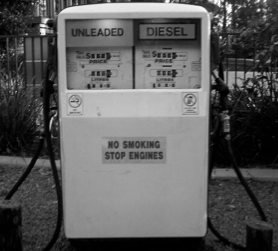Skip over navigation


Or search by topic
Number and algebra
Geometry and measure
Probability and statistics
Working mathematically
Advanced mathematics
For younger learners
At the Pumps
Age 7 to 11
Challenge Level 





- Problem
- Getting Started
- Student Solutions
- Teachers' Resources
At the Pumps

People in England buy their petrol in litres but often talk about the old measure of gallons.
Can you find out how many litres there are in one gallon?
When you've found out, let's suppose that I have to pay £1.00 for each litre.
I want to fill my 12 gallon petrol tank. How much will it cost me?
It would be good if you could talk to someone about how you worked this out and then please let us know too.
Why do this problem?
This problem challenges pupils to use their mathematical knowledge and skills in a near-real situation, with no leads as to what operations and previous knowledge are needed to find a solution.
Possible approach
You could use this activity as a starter for investigating how, and where, we find out further information on a topic. It is also useful as a stimulus for encouraging pupils to think about different measures - you could start a lesson inviting learners to suggest different ways of measuring capacity, which would then lead into a discussion about the need for conversions.
After reading the problem it would be good to spend some valuable time talking about what further information might be needed and what kind of calculations may be necessary. Ask children to gather ideas in pairs then sharing with the whole group before working towards a solution. It would be worthwhile to invite children to estimate what they think the answer will be as this could serve as a
checking mechanism later in the problem-solving process.
Key questions
Tell me what you know about gallons.
What information do you think we may need?
How can you find that (the information) out?
What would you estimate the answer to be?
Possible extension
Encourage the pupils to create similar problems and look at other related measures in a similar way.
Possible support
Calculators will be useful to help with more complicated calculations. Having the internet and/or books available to discover the conversion would be a good idea.
You may also like
Weighing Fruit
Can you use this information to estimate how much the different fruit selections weigh in kilos and pounds?

